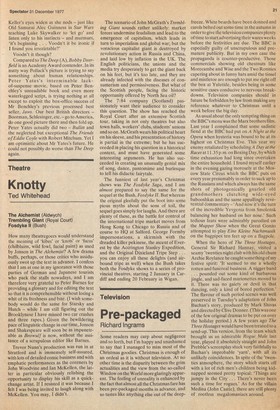Television
Pre-packaged
Richard Ingrams
Some readers may carp about negligence and so forth, but I'm happy and unashamed to say that I managed to miss most of the Christmas goodies. Christmas is enough of an ordeal as it is without television. At no other time is the disparity between the grim actualities and the view from the so-called Window on the World more glaringly apparent. The feeling of unreality is enhanced by the fact that almost all the Christmas fare has been pre-packaged months in advance, and so tastes like anything else out of the deep freeze. White beards have been donned and carols belted out some time in the autumn in order to give the television companies plenty of time to start advertising their wares weeks before the festivities are due. The BBC is especially guilty of unscrupulous and premature publicity. But in my own case the propaganda is counter-productive. Those commercials showing old chestnuts like Morecambe and Wise and the Two Ronnies capering about in funny hats amid the tinsel and mistletoe are enough to put me right off the box at Yuletide, besides being in some sensitive cases conducive to nervous breakdowns. Television companies should in future be forbidden by law from making any reference whatever to Christmas until a week before the big day.
As usual about the only tempting thing on the BBC's menu was the Marx brothers film. Last year I complained that some sadistic fiend at the BBC had put on A Night at the Opera when hysteria was bound to be at its highest on Christmas Eve. This year my enemy retaliated by scheduling A Day at the Races at 11.35 p.m. on Boxing Day, by which time exhaustion had long since overtaken the entire household. I found myself earlier in the evening gazing morosely at the Moscow State Circus which the BBC puts on every year presumably in order to suck up to the Russians and which always has the same shots of photogenically gnarled old grandmothers clutching wide-eyed babooshkas and the same appallingly reverential ommentary — 'And now it's the turn of the incredible Yev.genia from Smolensk balancing her husband on her nose.' Such tedious feats were admirably parodied on the Muppet Show when the Great Gonzo attempted to play Eine Kleine Nachtmusik on the bagpipes ten feet up on a flagpole.
When the hero of The Three Hostages, General Sir Richard Hannay, visited a seamy 'twenties night club with his old chum Archie Roylance he caught something of my festive spirit: 'It seemed to me a wholly rotten and funereal business. A nigger band „ . pounded out some kind of barbarous jingle, and sad-faced marionettes moved to it. There was no gaiety or devil in that dancing, only a kind of bored perfection.' The flavour of such period scenes was well preserved in Tuesday's adaptation of John Buchan's story, produced by Mark Shivas and directed by Clive Donner. (This was one of the few original dramas to be put on over the holiday period.) A few years ago The Three Hostages would have been treated to a send-up. This version, from the team which brought us an admirable Rogue Male last year, played it absolutely straight and John Prebble's screenplay stuck very faithfully to Buchan's improbable 'yarn', with all its unlikely coincidences. In spite of the 'twenties atmosphere, the story which starts off with a lot of rich men's children being kidnapped seemed pretty topical: 'Things are jumpy in the City . . . There's never been such a time for rogues.' As for the villain Medina (John Castle), there are still plenty of rootless megalomaniacs around.






































 Previous page
Previous page